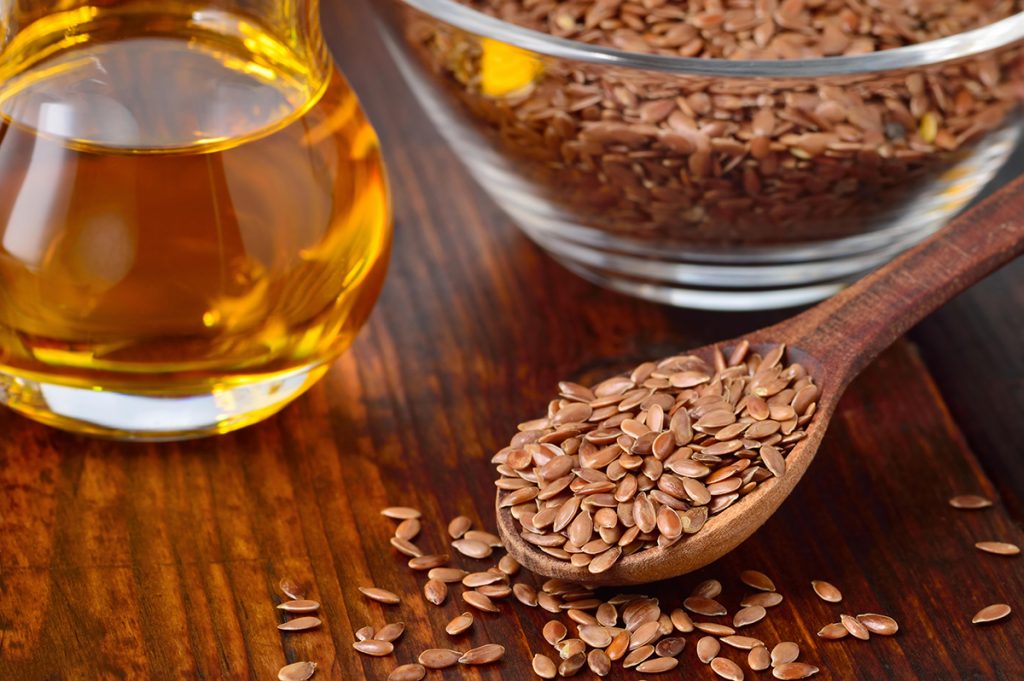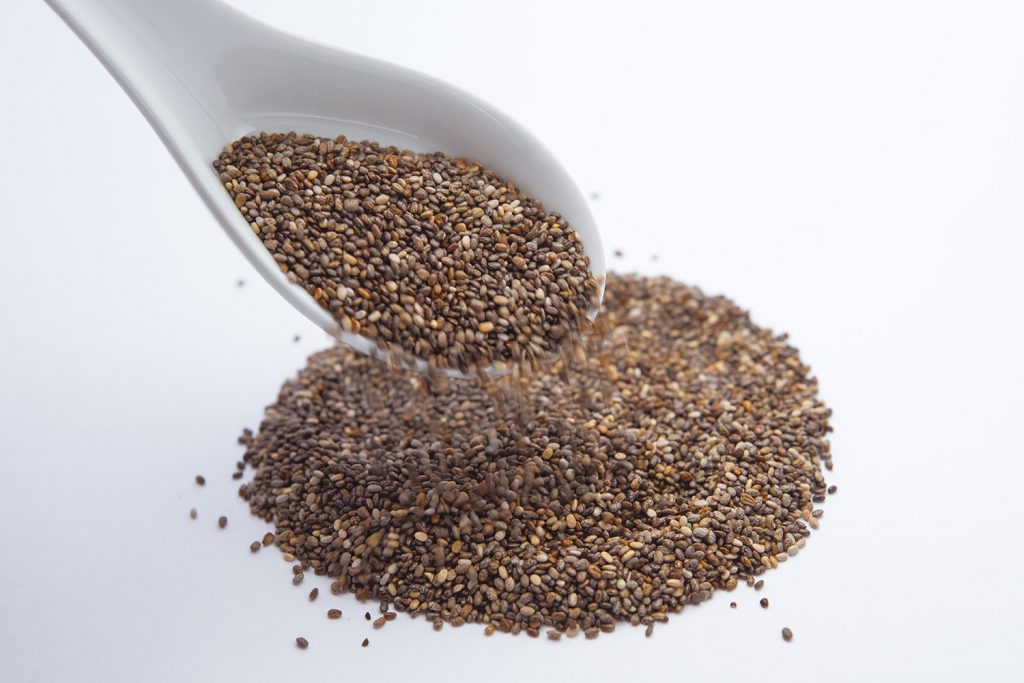How to Stock a Heart Healthy Kitchen
 If you keep heart healthy foods on hand and easily accessible you will be much more likely to see success in your efforts to lower cholesterol and blood pressure. If you keep unhealthy foods within reach you will make it much harder to achieve your heart health goals. Don’t rely on will power! Stock you kitchen for success. Here are some essentials to keep on hand:
If you keep heart healthy foods on hand and easily accessible you will be much more likely to see success in your efforts to lower cholesterol and blood pressure. If you keep unhealthy foods within reach you will make it much harder to achieve your heart health goals. Don’t rely on will power! Stock you kitchen for success. Here are some essentials to keep on hand:
Whole grains, such as barley, oats, rice, buckwheat, and quinoa, are rich in fiber, antioxidants, vitamins, and minerals. These nutrient dense grains promote a healthy heart.
Olive oil
Continue reading
Tips to Add Flax to Your Diet

Flax is an oilseed similar to canola and sunflower being oilseeds. Flaxseeds are derived from flax.
Benefits of Adding Flax to Your Diet
There are many benefits associated with adding flax to your diet, which are derived from a different part of the flaxseed. You have the heart-healthy fat content, the fiber, and the lignan.
Lignan’s are a class plant compounds called phytoestrogens that act as antioxidants.
Some of the health benefits that may be associated with flax include:
Continue reading
How to Use Flaxseed to Lower Cholesterol

Flaxseed is high in dietary fiber and omega 3 fatty acids. Both of which you need to increase in your diet as your work to lower cholesterol levels. Here are 10 ways you can incorporate flaxseed into your diet.
- Sprinkle on your cereal every morning. . .hot or cold.
- Add to pancake or waffle batter.
- Mix in your orange juice.
- Add to muffins.
- Mix in yogurt.
- Sprinkle on fresh salad greens.
- Add to cottage cheese.
- Add to spaghetti sauce, meatloaf, and lasagna.
- Add to cookie dough.
- . . . .get creative! It can be an addition to just about anything.
Grind Your Flaxseed
Heart Disease – Is flax oil or fish oil better to reduce heart disease?
A recent study published this past September compared the benefits of flax oil versus fish oil in raising blood levels of heart healthy omega 3’s. Adequate omega 3 intake is linked to lower blood pressure, lower triglycerides, increased HDL cholesterol, and reduced arterial inflammation.
Flax oil contains the omega 3 fatty acid ALA (alpha-linolenic acid), while fish oil contains EPA (eicosapentaenoic acid) and DHA (docosahexaenoic acid). The benefits of ALA continue to be studied, but EPA and DHA have been positively linked to heart benefits.
The body can convert ALA to EPA and DHA, but it’s been well known that this conversion process is not efficient. According to a recent study published in Nutrition Reviews, 8-20% of ALA is converted into EPA. From this, only 0.5-9% is converted to DHA.
To test the benefits of ALA supplements (flax oil) in amounts commonly consumed, the study followed 62 firefighters. The participants were divided into 6 groups and monitored for 12 weeks. Here are the six groups:
1.2 grams of flax oil per day
2.4 grams of flax oil per day
3.4 grams of flax oil per day
0.6 grams of fish oil per day
1.2 grams of fish oil per day
Sunflower placebo
Results showed an increase of EPA and DHA in the blood for those taking both levels of fish oil supplements. The EPA levels in red blood cells almost doubled by the studies end.
Now, the flax oil supplements did not have the same result. Those receiving 1.2 grams of flax oil daily did not show a significant rise in EPA and DHA, only ALA. The 2.4 g and 3.6 g flax oil supplements increased ALA, EPA, and DHA levels. EPA was increased 30% with a 2.4 g supplement and 40% with 3.6 g of flax oil daily. However, there was no corresponding increase in DHA. This confirmed the original belief that conversion of ALA into DHA is minimal.
The results of this study support my recommendations related to omega 3 supplements. First, consume a diet rich in omega 3 fatty acids (i.e. fish, nuts, flaxseed). Second, select a fish oil supplement high in EPA and DHA. Choose a supplement with 850 mg of DHA and EPA per gram of fish oil. Third, if you do not tolerate fish oil, select a flax oil supplement providing at least 1 gram of omega 3 fatty acids daily.
Sign up for The Heart of Health ezine to receive regular heart health and weight loss tips from dietitian Lisa Nelson. Subscribers receive the free e-course “8 Simple Steps to Lower Cholesterol”.
All the best,
Lisa Nelson RD
Flaxseed and cholesterol – 3 Ways to Use Flax to Reduce Heart Disease
Flaxseed is a great diet addition if you are looking to reduce your risk for heart disease. Flaxseed is a rich source of omega 3 fatty acids, fiber, and phytochemical lignans.
Flax is an option for individuals that dislike fish, but want to boost their intake of omega 3 fatty acids which are known to decrease heart disease risk by lowering cholesterol and blood pressure. Also, the fiber content makes meals “heavier” so you feel full longer, decreasing your likelihood to overeat. The fiber also promotes a lower LDL cholesterol level. Flaxseed lignans have been linked to cancer protection.
Aim for adding 1 teaspoon of flax oil to your diet each day or 1 tablespoon of milled flax. Adding flax to your diet is very simple. Here are a few options:
1. Flaxseed must be ground in order for your body to utilize the omega 3 fatty acids within, so buy your flaxseed ground and add to cereal, yogurt, salads, baked goods, and hot dishes. You are able to grind whole flaxseed with a coffee grinder or blender. Be sure to keep ground flaxseed refrigerated!
2. Flax oil can be used as part of a salad dressing or in recipes that call for oil. Flax oil contains the beneficial omega 3’s, but no fiber.
3. Use flaxseed as a recipe substitute for fat and eggs. Substitute 3 tablespoons ground flax for 1 tablespoon butter, shortening, or vegetable oil. To use flax in place of eggs, mix 1 tablespoon ground flax with 3 tablespoons water and let mixture set until gel like (1-2 minutes). Use mixture in place of 1 egg.
All the best,
Lisa Nelson RD
How to Lower Cholesterol in 8 Simple Steps
Lower Cholesterol – Top Omega 3 Sources to Lower Cholesterol
If you have been following along, you know from the article "Get a Grip on Fatty Acids" that the right ratio of omega 6 to omega 3 fatty acids promotes a lower cholesterol.
The goal is not to cut omega 6 fatty acids (such as corn oil, beef, and chicken) completely from the diet, but to achieve a ratio of 4:1 or 1:1 omega 6 to omega 3. In order to attain this ratio you need to increase your omega 3 intake.
Your options for doing this:
1. Eat fish at least twice a week.
If you like fish, this would be my first choice. Fish contains DHA. Research is starting to indicate health benefits, such as lower cholesterol, lower triglycerides, and higher HDL (good) cholesterol, linked to DHA alone. Be aware of mercury content of fish, especially if you are pregnant.
2. Take a fish oil supplement.
Start with the smallest bottle you can find and make sure you do not have the unpleasant side effect of burping with a fishy aftertaste. Not everyone has this problem, so you may be fine. To decrease likelihood of this problem I recommend taking the supplement and then eating. That way something is "on top" of the fish oil. Fish oil has a tendency to go rancid, so keep supplement refrigerated, especially if you buy a bottle of 250 or more.
3. Flaxseed.
You can buy flaxseed two different ways – whole seed or ground. In order for the body to utilize the omega-3 fatty acids, flaxseed must be ground. If the flaxseed is not ground it passes straight through the body without being absorbed. Flaxseed is high in fiber, so by ingesting whole flaxseed you have increased your fiber intake, which is beneficial, but if you grind your flaxseed you will have the added benefit of increasing your omega-3 fatty acid intake and lowering cholesterol.
4. Flaxseed oil supplement.
Provides the omega 3 fatty acid ALA in a simple supplement. Now, ALA is not as effective as DHA and EPA at lowering cholesterol, but still results in an improved ratio of omega 3 to omega 6. Again, may go rancid so refrigerate.
5. Add omega 3 nut and seed sources to your daily intake.
Especially walnuts, pumpkin seeds, Brazil nuts, and sesame seeds. Nuts are high calorie, so watch your intake. If you gain weight, you are not doing your heart any favors!
Access the ecourse How to Lower Cholesterol in 8 Simple Steps HERE.
All the best,
Lisa Nelson RD



